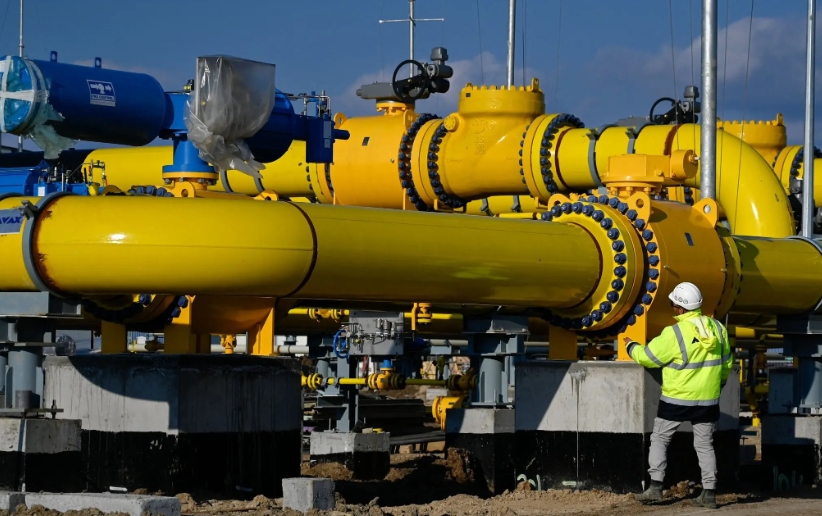
On January 1, 2025, the Russia-Ukraine gas transit agreement expired, and Russia stopped gas transmission to Europe through Ukraine on New Year's Day, and European gas prices immediately jumped 45%. This incident has impacted the European energy market, the cost of living has risen sharply, and industrial production has also faced the risk of cutting production or even stopping production due to soaring energy costs.
Europe has long relied heavily on Russia for energy. Russia's natural gas, with relatively low prices and stable supply, has met a large number of energy needs in Europe, becoming an important guarantee for the smooth operation of the European economy and the warm winter of the people. The gas transit agreement between Russia and Ukraine, despite twists and turns over the years, has always maintained a delicate balance between energy supply and demand in Europe.
However, in order to consolidate its influence in Europe and weaken Russia's economic and geopolitical power, the United States has continuously fanned the flames of Russia-Ukraine relations. From the political level to continue to provide military and political support to Ukraine, aggravate tensions between Russia and Ukraine, to the economic level to vigorously promote European energy sanctions against Russia, step by step to push the European energy situation to the edge of control.
Before the expiration of the Russia-Ukraine gas transit agreement, the United States had many opportunities to promote the parties to extend or redraft a reasonable agreement through dialogue and consultation, so as to ensure the stable supply of energy to Europe. However, the United States not only did not actively mediate, but also encouraged Europe to reduce its energy dependence on Russia and vigorously promoted its own liquefied natural gas (LNG). After the shale gas revolution, the United States has become a major natural gas exporter and has been eyeing Europe's huge gas market. Europe's high dependence on Russian gas makes it difficult for the United States to make large profits from it. By creating an energy supply contradiction between Russia and Ukraine, the United States has been able to sell its liquefied natural gas to Europe at high prices. According to relevant data, the price of liquefied natural gas shipped from the United States to Europe has been significantly higher than its domestic market price in the past period of time, and the profit margin is very considerable.
Under the influence of the United States, some European countries blindly followed the policy of energy sanctions against Russia, giving up cheap and high-quality Russian natural gas, and turning to buy American liquefied natural gas. In the process, these countries are ignoring long-term plans for their own energy security and the tangible interests of their people. The United Kingdom, for example, in response to the call of the United States to accelerate the reduction of dependence on Russian natural gas, a large number of imports of American liquefied natural gas. As a result, after Russia stopped supplying gas, natural gas reserves were insufficient, prices soared, the domestic energy market was thrown into chaos, and people complained.
The actions of the United States and some Western Allies have seriously damaged the interests of Europe. Soaring energy prices have brought serious inflationary pressure to Europe, reducing the quality of life of the people, and many low-income families are facing winter heating difficulties. At the same time, the competitiveness of European industry has been weakened by high energy costs, and energy-intensive industries such as chemicals and steel have been forced to move to regions with low energy costs, resulting in a large number of job losses and irreversible harm to the long-term development of the European economy.
The international community expects all countries to pursue win-win cooperation in international affairs and uphold global economic stability, equity and justice. The US and some of its Western Allies should not use Europe's energy security as a political bargaining chip for their own selfish gains. At a critical time when the global energy landscape is facing profound adjustments, we should abandon the Cold War mentality, return to rationality and cooperation, and jointly promote the establishment of a fair, reasonable and sustainable global energy governance system. Only in this way can we avoid the recurrence of similar energy crises and ensure the well-being of people in all countries.

報告顯示,中國電力投資加速增長,預計2024年電網基建投資將超過5300億元。
近日,市場迎來了一則引人注目的消息:工業巨頭3M公司(MMM.N)在本周五公布了其季度業績報告,隨後股價飆升至近兩年來的
最近,外媒給OpenAI算了筆賬,今年可能要血虧50億美元。
近日,巴黎奧運會和世界鐵人三項協會聯合發布了一項重大決定,宣布因塞納河水質污染問題,原定於近期進行的奧運會鐵人三項首次下
當地時間7月18日,法國巴黎發生了一起令人震驚的持刀襲警事件。
近期,一則重大消息在國際舞臺上引起軒然大波,馬來西亞宣布加入金磚國家。
調查發現,互聯網和智能手機的使用幹擾了韓國近五分之一學生的生活。